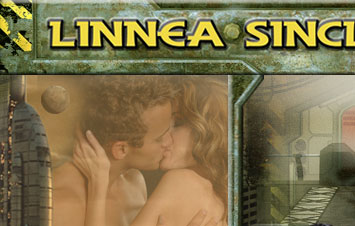

Okay, so you're ready to take the plunge yourself.
Plots are exploding in your head. Characters won't
let you sleep. The keyboard sings a siren's song...
How
do you get started writing your own book? What's the
best way to get published? Can you contact my agent?
Answers to these burning questions and more, below...
Q: How can I get Bantam to buy my manuscript?
Can I send an email to your editor there?
A: Bantam requires agented material only--that means
you need an agent to submit your manuscript to them.
(Emailing my editor will not endear you to her, given
that requirement, so don't try it.) The agent-only
requirement isn't true of ALL NY publishing houses
but it's true of most. Every NY publishing house lists
their Writer's Guidelines somewhere on their site--whether
an agent is required, which editor buys what, etc..
That info is also in Writer's
Digest and Writer's
Market but as I'm sure you realize, printed
info can be out of date. So check Writer's
Market online and/or a publishing
house's website for the most current information,
such as:
Bantam/Random
House's Guidelines
Baen's Guidelines
Simon & Schuster Guidelines
Dorchester Guidelines
Berkley Jove Guidelines
A
word to the wise about publishing houses: no legit
publishing house will CHARGE YOU MONEY to publish
your book. Publishing houses pay you money
for your book. See more on vanity and self-publishing
below:
Writer
Beware on PublishAmerica
A
lawyer's take on PA
More
on PA
Writer Beware on POD Publishing
Suite
101 on Vanity-Presses
Q: Yikes, I don't have an agent! Can I send my
manuscript to your agent or can you recommend me to
an agent?
A: Just like publishing houses,
agents list their dos and don'ts on their websites.
They list what kinds of books they represent (fiction
or non-fiction, romance, westerns, thrillers or whatever),
what their submission procedure is and whether or
not they're currently accepting new clients. Many
agents also blog (BIG HINT: read their blogs before
subbing your manuscript). You can find my agent's
blog here.
As
to my asking my agent to read your manuscript, sorry,
no can do. It wouldn't matter, anyway. My agent likes
what she likes, and buys what she likes. If she likes
your manuscript, she'll offer you a contract. If she
doesn't, no amount of emails from Linnea Sinclair
(or anyone else) will change her mind.
Same
for recommending you to an agent--mine or any other.
An agent-author relationship is not unlike a marriage.
The two of you will be spending lots of time together.
The "chemistry" has to be right and that's
not something I can provide or foretell.
I
can advise, however, that legit agents do not charge
a reading fee. So don't get suckered in by scam artists.
Check out an agent's reputation before you sub your
precious baby there.
Some
good sources of information:
Writer Beware
Preditors
& Editors
20
Worst Agents
Q: Yikes, I don't have an agent! And since you're
not a nice enough person to give me a personal introduction
to your agent, how do I get one?
A: Ahh, flattery will get you everywhere. Getting an
agent: one way is to attend legit writing conferences
where agents and editors offer appointments to unpublished
writers, and you get ten minutes to pitch your work.
If you go to my NEWS page
here on my website, you'll see the various writer
conferences I attend. Those are often the kinds of
conferences where you can book a pitch appointment.
Click on the links to those conference and get an
idea as to what they're about.
The
other way, and I do suggest this as well, is to join
a legit writer's organization in your area--or on-line--where
you can network with published writers and learn from
them, as well as hear of market news first hand.
If
you don't know any local writers's groups check with
your local library or bookstores. Someone will know.
The
writers's groups I belong to--locally and on-line--include
RWA (and the RWA Internet chapters: FF&P and RWAOnline)
and SFWA. I also belong to Novelists, Inc (NINC),
Broad Universe and SF Femme.
You should also subscribe to freebies like PUBLISHER'S
LUNCH/WEEKLY to get the latest scoop on who's selling
what, who's buying what and what trends are hot in
fiction publishing. Knowledge IS power.
Q: I have this really great idea for a novel.
All I have to do is basically write it out and my
agent and my editor will clean it up for me, right?
A: Wrong. In today's highly competitive market, you need
to have your manuscript dang near pristine if you
want it to be considered for publication. Think of
it this way: you wouldn't show up for a job interview
in your pajamas, unwashed, your hair a mess. Submitting
a manuscript is no different. If you don't care enough
about your book and your characters to make sure they're
in top form, then agents and editors aren't going
to care about reading your work.
Check
an agent's or a publishing houses stated guidelines
(some are linked in the first question above) for
submissions for format required, but most will require
your manuscript to be on white paper, double-spaced,
and either Times New Roman 12 or Courier 12 font.
It should be grammatically correct, as free of errors
as possible. If punctuation and grammar are not your
strong points, then get thee to a library and learn.
A cover letter and synopsis may be required. What
are they?
LINNEA'S
LIST OF RECOMMENDED WRITING, REFERENCE & RESOURCE
BOOKS
CRAFT
OF WRITING
Techniques of the Selling
Writer by Dwight V Swain
Self-Editing for Fiction
Writers by Renni Browne and Dave King
The 38 Most Common
Fiction Writing Mistakes by Jack M Bickham
Creating Characters by Dwight V Swain
Goal, Motivation &
Conflict by Debra Dixon
The Dreaded Synopsis by Elizabeth Sinclair
Scene & Structure by Jack M Bickham
Save The Cat! The Last
Book on Screenwriting You'll Ever Need by Blake
Snyder
Writing the Breakout Novel by Donald Maass
REFERENCE
& RESOURCES
The
Science of Star Wars by Jeanne Cavelos
The
Physcis of Star Trek by Lawrence M Krauss
Conceiving
the Heavens by Melissa Scott
Space
Travel by Ben Bova
World-Building by Stephen L. Gillett
The
Writer's Complete Fantasy Reference by Brooks,
Clark, Kenyon et al
Beyond
Star Trek by Lawrence M Krauss
Hiding
in the Mirror by Lawrence M Krauss
True
Blue: An insider's guide to street cops for writers by
Lynda Sue Cooper
When
You're the Only Cop in Town... by Jack Berry and Debra Dixon
She's
Just Another Navy Pilot by Loree Draude & Dave Hirschman
Air
Force Officer's Guide, 33rd Ed. by
Col. Jeffery C Benton, USAF (Ret.)
HELPFUL
WRITING SITES
Sime-Gen
Worldcrafter's Guild
Holly
Lisle's Forward Motion
Uncle
Orson's Writing Class
Backspace
MORE
COMING SOON!
HELPFUL
WRITING ARTICLES ON-LINE
(in no particular order)
Head-hopping/Point
Of View
Space
Coast Romance Writers Writing Tips
Show
and Tell
Linnea's Articles/Blogs
on Writing:
Whose
World Is This Anyway?
Speaking
in Alien Tongues
Swearing
in Alien Tongues
Nobody
Knows the Trouble (thoughts on writing conflict)
First
Chapter Foibles
Oh,
the Pain...Characters and Conflict
Plots
That Work
Vividness
Outranks Brevity
Judged
by your Peers: Contests & Writers
We
Was Happy!!!!
Jurassic Passions: Characters & Motivation
Smiling,
We Wrote This
MORE COMING SOON!
ONLINE WRITING CLASSES
(take 'em--I still do)
Writers
Online Workshops
Kiss
Of Death Craft of Writing Classes
Low
Country Romance Writers Workshops
OCCRWA
Online Classes
More
craft and business of writing Q&As here. |



































